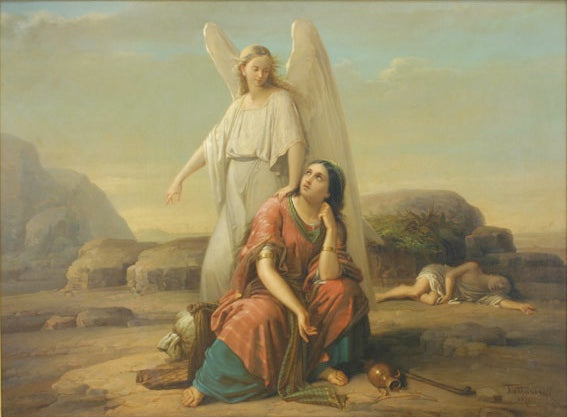Description
The work "Agar in the desert", created in 1870 by the Romanian painter Gheorghe Tattaralescu, is an eloquent example of the ability of historical painting to transmit deep emotions and symbolic narratives. In this painting, Tattararescu addresses the biblical issue of agar, Abraham's concubine, who was banished with his son Ismael to the desert. This moving scene, rich in religious and cultural reference, evokes a sense of loneliness and despair.
The composition of the painting is remarkable. Agar, represented in the center, sits in the shadow of a rock, his face reflects the anguish and concern for his son's future. His dress, of a dark tone that contrasts with the sandy environment, attracts attention to his figure, emphasizing his central role in the narrative. Beside him, Ismael is lying, with a gesture of vulnerability, which resonates with the universal message of motherhood and the struggle for survival. The relationship between mother and son manifests with a palpable intimacy, underlining the emotional connection between them.
The use of color is also a prominent aspect in this work. Tattararescu uses a warm palette dominated by yellow and brown tones that evoke the arid desolation of the desert. This use of color not only establishes the environment, but also highlights the emotional dilemma of the characters. The flashes of the blue sky in the background suggest a ray of hope, in contrast to the oppressive earthly reality, and underline the duality between despair and faith.
From an artistic point of view, TattareRescu's style can be placed within a realistic tradition, which is marked by meticulous attention to details. His training in Western Europe, particularly in Italy and France, influenced his technique and his approach to narrative and dramatic issues. His works guided the history and mythology, merging their national heritage with European currents. "Agar in the desert" is not only a representation of a moment in the biblical narrative, but also a testimony of the artist's talent to capture the human experience in all its complexity.
It is important to note that TattareRescu, in addition to being a renowned painter, was also an outstanding art pedagogue in Romania. His work not only represents a milestone in his personal career, but also an important legacy for Romanian art. "Agar in the desert" stands out among his work for emotional depth and the representation of human suffering, which resonates with spectators at different times.
In summary, "Agar in the desert" of Gheorghe Tattararescu is a work that, through its carefully constructed composition, use of color and its emotional load, invites reflection on the experience of motherhood and the struggle to adversity. The painting stands as a historical parallel that resonates and remains in force, evoking both the anguish of the characters and the human capacity of hope.
KUADROS ©, a famous paint on your wall.
Hand-made oil painting reproductions, with the quality of professional artists and the distinctive seal of KUADROS ©.
Art reproduction service with satisfaction guarantee. If you are not completely satisfied with the replica of your painting, we refund your money 100%.

